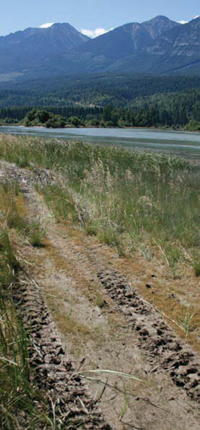As the Olympic spotlight begins to shine on British Columbia, citizens need to learn more about the exponential increase of habitat destruction caused by off-road vehicle ‘wreckreation.’
Not only is the backcountry environment getting trashed, but non-motorized trails are being over-run by irresponsible ATV and motor bike riders, in some cases making these trails unusable for cycling and hiking. While the problems are occurring throughout the province, particularly in alpine areas and wetlands, it is in the drier Thompson, Okanagan and Kootenay grasslands where off-road wreakreation is most problematic because these machines can go anywhere.
Once areas have been damaged, the impacts can last for decades. The escalating problems from off road vehicles is compounded by the lack of regulations, as BC is the only jurisdiction in North America that does not require licenses or training to operate these vehicles. The Coalition for Licensing and Registration of Off-Road Vehicles, which includes the ATV Association,the Outdoor Recreation Council and stewardship groups, produced a report with 47 recommendations, from licensing to trail markers. The BC Wildlife Federation is not a member of the Coalition, advocating for a simplified approach featuring point of sale licensing to enable identification of irresponsible use. The province is now finally considering new regulations, including visible license plates, to better control off-road vehicle use.
Thousands of riders from other provinces and states where rules exist travel to BC yearly and tear up the hillsides. Dave Quinn, program manager with Wildsight says, “It is not just summer use that is out of control, as snowmobilers flock here from Alberta every winter and shred up critical caribou habitat.” In 2007, 3,000 snowmobilers tore up Boulder Mountain near Revelstoke during their “Big Iron Shootout.” Consequently the local snowmobile club has been working with government to discourage future large events like this one that can damage plantations and leave mounds of litter. Europeans who have come to cycle the province’s famed Kettle Valley Railway trails are returning home with the message that these trails are becoming unusable for cyclists due to the damage caused by ATVs and motorcycles, particularly near Midway and Beaverdell.
The TransCanada Trail has also been hit hard by off-road vehicles, especially in the Chilliwack River valley. Hardest hit in the Shuswap are the accessible alpine areas such as atop Crowfoot Mountain and on Hunter’s Range, but the problems occur wherever ATVs, motorcycles and 4x4s enter wetlands or make new trails on steep hillsides. The off-road vehicle clubs have a key role in solving the problems caused by a small but growing group of irresponsible riders. Not only do these groups help to educate riders and encourage responsible use of trails, but they also watch for the trouble makers and report infractions.
The forest service’s compliance and enforcement officers also have been known to ticket offenders. Existing laws can result in fines up to $100,000 and up to one year in jail or both. Earlier this year on the May long weekend, Shuswap/Okanagan forest service staff checked over 500 riders and issued 48 tickets and warnings, made one arrest and seized one vehicle. Members of the public can also help report violations by phoning the RAPP line (1-877-952-7277) or by phoning their local forest service office.
BC deserves national and international censure for its lack of regulations governing backcountry recreation. Sustainable, non-motorized tourism is being impacted by the ongoing motorized exploitation of the backcountry. After decades of efforts by environmentalists, forest companies have improved their practices; but now some of the greatest environmental problems are being caused not by resource companies, but by out-of-control ‘terrain terrorists’ riding roughshod over sensitive grasslands, wetlands and alpine meadows across this province. Not only are regulations and enforcement actions sorely needed, but B.C. needs a new backcountry culture that would help discourage irresponsible off-road vehicle use.
***
Jim Cooperman is president of the Shuswap Environmental Action Society, www.seas.ca
[From WS November/December 2009]
